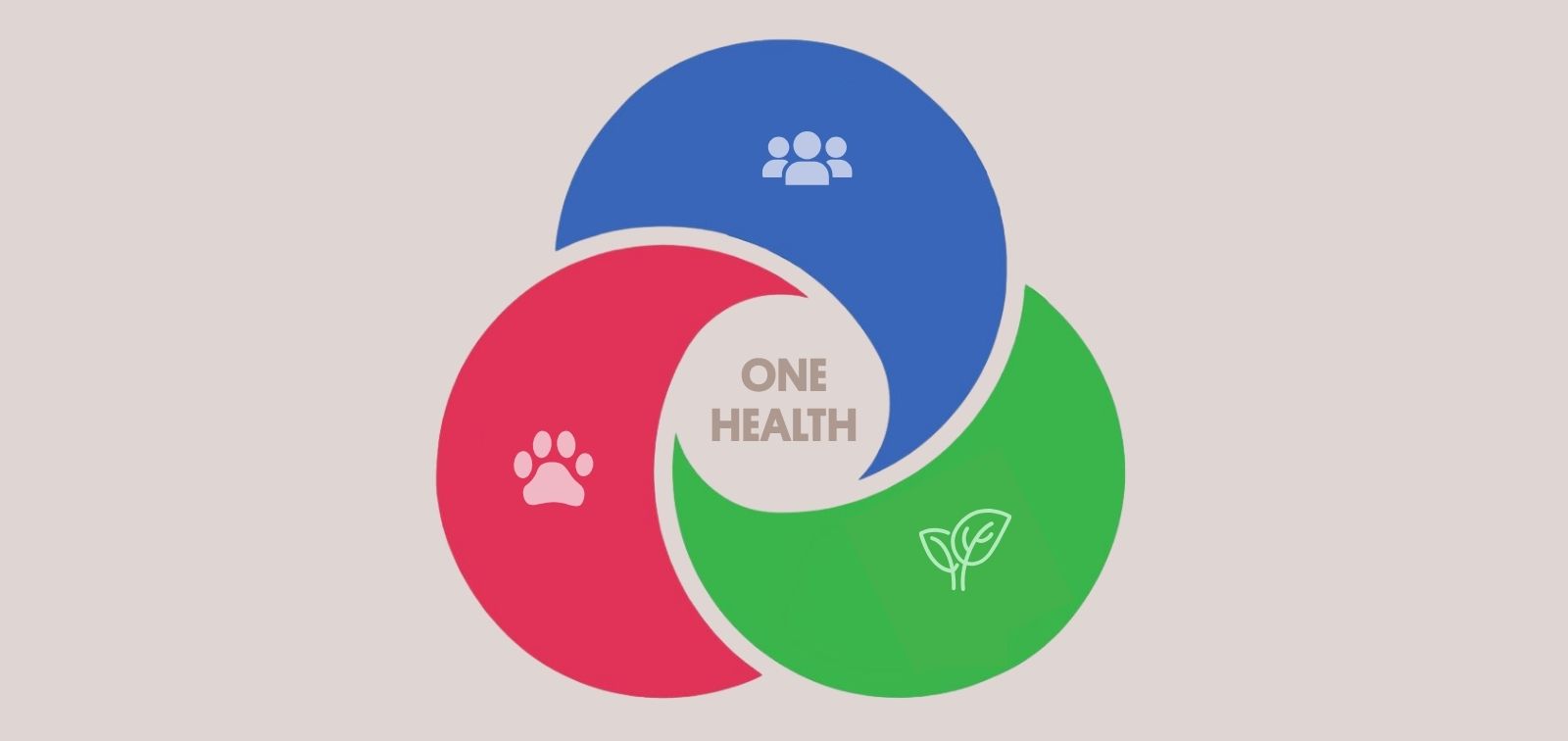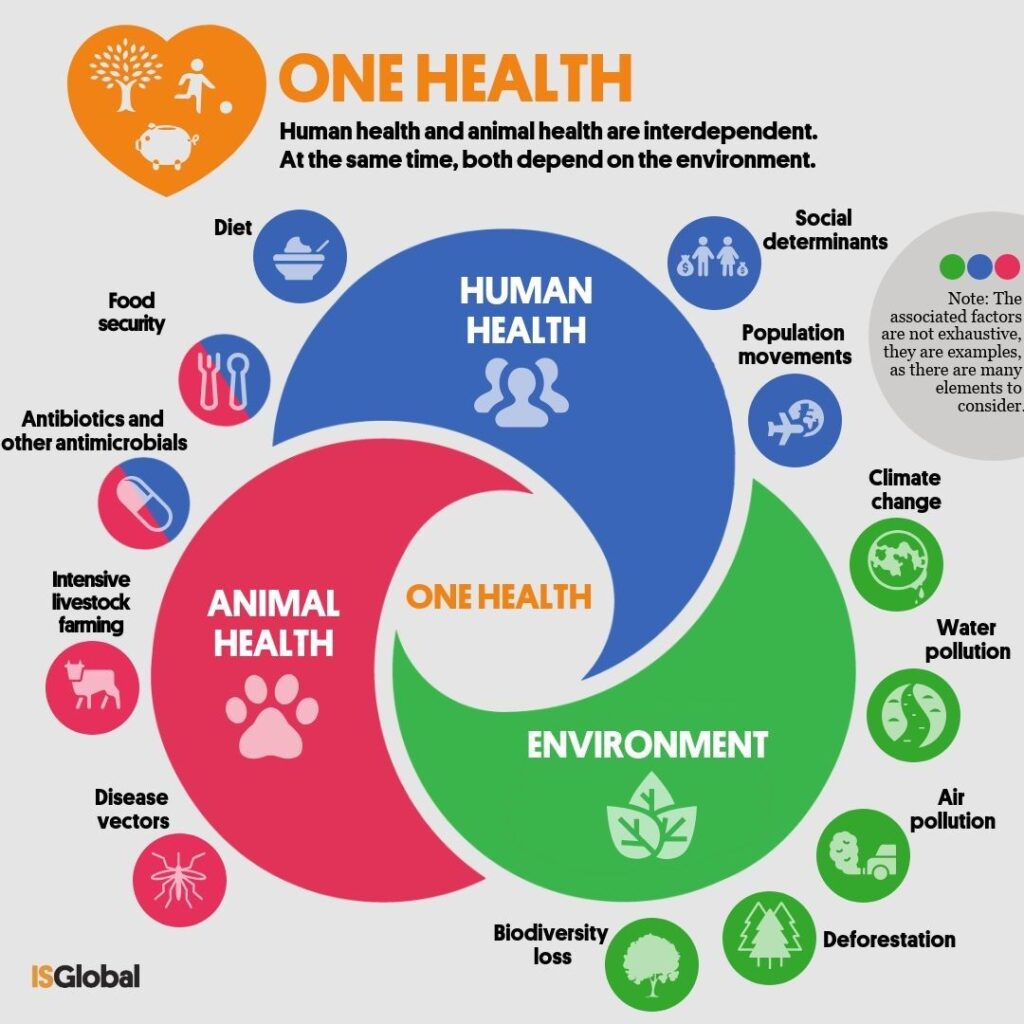One Health

What is One Health?
One Health is a comprehensive and unifying approach that seeks to balance and optimise the health of people, animals, and ecosystems through integration rather than treating them separately.
- It recognises that the health of humans, animals, and ecosystems is closely interrelated.
- It points out that changes in these relationships can increase the risk of the emergence and spread of new diseases.
- It requires collaboration, communication, and coordination among multiple sectors and disciplines, such as medicine, veterinary science, ecology, public health, and the environment.
This multidisciplinary and multisectoral approach enables more effective monitoring of emerging risks and the design of more integrated prevention and response strategies.
Why is it needed?
- Growth and expansion of the human population. People are occupying new territories, invading wild habitats, and coming ever closer to wild or domestic animals, which increases our contact with other species.
- Environmental changes, land use, and pressure on ecosystems. Deforestation, agricultural expansion, intensive livestock farming, habitat fragmentation, and greenhouse gas emissions damage ecosystem stability and create favourable conditions for the emergence of diseases. According to the WHO, animal trade, agriculture, urbanisation, climate change, and the invasion of wild areas are stress factors for human activities and ecosystems, creating new conditions conducive to the emergence and spread of diseases.
- Global mobility of people, animals, and goods. International transport, the trade in live animals or animal products, and human movement accelerate the spread of pathogens to new geographical areas.
These three factors together promote zoonotic transmission—that is, diseases transmitted from animals to humans—posing new risks to public health.
Applications of the approach
The One Health approach is not merely a theoretical framework but has practical applications across numerous fields. It is used, for example, in the surveillance and control of zoonotic diseases such as rabies, avian influenza, or Ebola, which can be transmitted from animals to people and represent serious public health risks. It also plays a key role in food safety and nutrition, ensuring that animal-derived foods are produced and distributed safely and sustainably.
Furthermore, One Health promotes the sustainable use of natural resources and the responsible management of pollutants and environmental contamination, recognising that ecosystem degradation directly affects both human and animal health. Another crucial area of application is the control of antibiotic resistance, a growing problem that affects humans, animals, and the environment alike.
By enabling the identification and reduction of risks at the interface between humans, animals, and ecosystems, One Health is essential for preparedness and response to outbreaks and pandemics. A concrete example of its implementation can be seen in rabies control, where vaccination campaigns in animals (especially dogs) have been carried out to reduce the risk of transmission to people.
At the international level, collaboration under this approach has taken shape in joint initiatives such as the One Health Joint Plan of Action 2022–2026, coordinated by various global organisations.
One Health, now more than ever
The One Health approach is becoming increasingly relevant because:
- Approximately 60% of emerging infectious diseases worldwide originate in animals.
- In the past three decades, more than 30 new human pathogens have been identified, 75% of which originated in animals.
- Failures to integrate the human, animal, and environmental domains have been considered key factors in responses to pandemics such as COVID-19.
- By addressing the links between human, animal, and environmental health, the One Health approach stands out as a transformative strategy for improving global health.
READ MORE
COLLAPSE
- Water: The Invisible Link in the Spread of Antibiotic Resistance(ISGlobal, 2025)
- One Health: How to Achieve Optimal Health for People, Animals and Our Planet(ISGlobal, 2024)
- One Health(OMS, 2023)
- 2022: The Year of One Health in Spain and Europe(ISGlobal, 2022)
- Integrating human, animal and environmental health: key to confronting future pandemics(ISGlobal, 2021)
MULTIMEDIA MATERIAL

